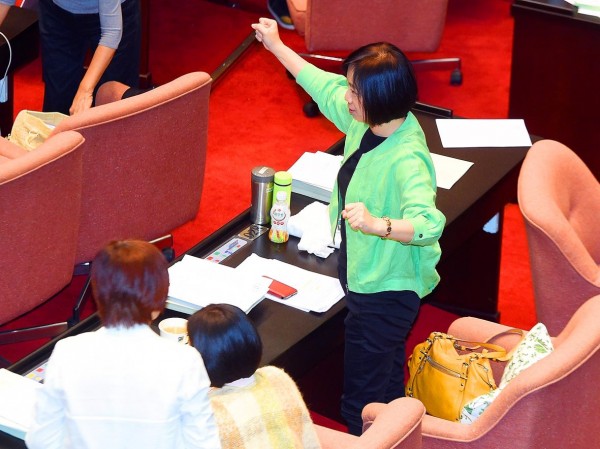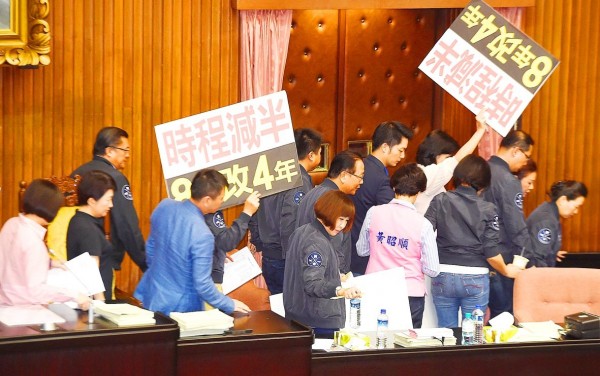《TAIPEI TIMES》 Forward-looking budget cut in half

Democratic Progressive Party Legislator Ho Hsin-chun cheers yesterday as the legislature passes the first article of the draft bill for the Forward-looking Infrastructure Development Program. Photo: Liao Chen-huei, Taipei Times
CONSENSUS: A new motion added three new projects — establishing friendly nursing rooms; measures to ensure food safety; and nurturing talent and boosting employment
By Sean Lin / Staff reporter
The special act on the Forward-looking Infrastructure Development Program yesterday cleared a third reading at the legislature, with lawmakers passing a Democratic Progressive Party (DPP) motion to adjust the program’s budget from NT$882.49 billion (US$28.93 billion) over eight years to NT$420 billion over four years.
The legislature met in plenary session to review the bill after the DPP caucus on Tuesday made a concession to adjust the program’s budget and time frame during cross-caucus negotiations, ending the Chinese Nationalist Party’s (KMT) occupation of the legislative speaker’s podium that began on Monday morning.
The DPP, KMT and People First Party (PFP) caucuses on the same day signed on a DPP motion to divide the program into two stages of four years each, with a NT$420 billion special budget for stage one.
Budget requests for the second stage are to be delivered to the legislature for review with the proviso that its size and time frame does not exceed the first budget.
The motion added three projects — establishing friendly nursing rooms in response to low birth rates; measures to ensure food safety; and nurturing talent and boosting employment — to the five projects outlined by the Executive Yuan: Rail construction, digital infrastructure, “green” energy, urban-rural development and aquatic infrastructure.
The National Development Council is to oversee the program, while Cabinet-level agencies are to be responsible for planning budgets for projects outlined in the program and local governments entrusted with a project should plan budgets accordingly, the motion said.
Central government agencies must conduct environmental impact assessments, and viability and cost-effectiveness plans, and submit the reports to the Executive Yuan for approval before a budget is allocated.
The debt ceiling for the overall spending of the entire program is set at 15 percent of the government’s annual expenditure, in accordance with the Public Debt Act (公共債務法).
Should a specific project run under budget, the excess funds should be returned to the central government, the motion said.
A draft article — proposed in response to New Power Party (NPP) and KMT demands — which says the Control Yuan and concerned agencies should punish officials found to be involved in illegal activity that causes a project to fall behind the 80 percent completed mark was also passed yesterday.
Land expropriation carried out for a project must be done according to due procedure on the condition that it is necessary and it serves the public interest.
The council should regularly update the progress of the projects on the Executive Yuan’s Web site.
Citing the low utilization rate of the Kaohsiung Mass Rapid Transit (MRT) system, KMT legislators criticized the government’s plan to dole out large sums — previously about NT$420 billion — to construct railway systems, prompting a war of words with the DPP caucus.
“The MRT might be taken for granted by Taipei residents, but for people living in the south of the nation it has remained a luxury,” DPP Legislator Rosalia Wu (吳思瑤) said, adding that a MRT system should not be a privilege of Taipei residents.
“The final version of the bill was rendered in response to overwhelming public pressure and strong criticism,” KMT Legislator Lee Yen-hsiu (李彥秀) said.
With budget proposals set to be reviewed by the legislature next week, the DPP had better be prudent over its budget allocation to avoid triggering a backlash, she said.
新聞來源:TAIPEI TIMES

Chinese Nationalist Party (KMT) legislators wave placards as they leave the speaker’s podium at the Legislative Yuan in Taipei yesterday after ending a boycott of the draft bill for the Forward-looking Infrastructure Development Program. Photo: Liao Chen-huei, Taipei Times




















